Did you know that vegetarian and plant-based diets have gained immense popularity in recent years? According to a study, the number of people following a vegetarian or vegan lifestyle has increased by 600% in the United States alone! With this growing trend, more and more individuals are searching for delicious and healthy alternatives to traditional meat dishes.
If you’re looking for a flavorful and satisfying meatless option, homemade veggie balls are the answer! These easy-to-make plant-based meatballs, also known as vegetarian meatballs, vegan meatballs, or meatless meatballs, are packed with essential nutrients and bursting with flavors. Whether you follow a vegetarian, vegan, or simply want to incorporate more plant-based meals into your diet, these homemade veggie balls are sure to satisfy your taste buds.
Key Takeaways:
- Vegetarian and plant-based diets have seen a 600% increase in popularity in the United States.
- Homemade veggie balls are a flavorful and satisfying meatless alternative.
- These veggie balls are suitable for vegetarians, vegans, and anyone looking to incorporate more plant-based meals into their diet.
- They are packed with essential nutrients and bursting with flavors.
- Stay tuned to discover an easy and tasty homemade veggie ball recipe!
A Look At This Delicious Veggie Balls Recipe
Are you looking for a tasty and plant-based alternative to traditional meatballs? Look no further! I’m excited to share this amazing homemade veggie balls recipe that will satisfy your cravings and leave you wanting more.
These veggie balls are made with a delicious combination of fresh vegetables like spinach, carrots, and mushrooms, giving them a savory and wholesome taste. They are a perfect choice for those who follow a vegetarian or vegan lifestyle, or anyone who wants to incorporate more plant-based options into their diet.
To make these easy veggie balls, you’ll need a few simple ingredients. Along with the vegetables, you’ll use corn flour to provide texture and binding. Optional cooked eggs can also be added for those who prefer a firmer consistency.
When it comes to flavoring, I recommend using a blend of salt, black pepper powder, sesame oil, and oyster sauce. These seasonings add a depth of taste that will have your taste buds dancing with joy. Additionally, feel free to experiment and add extra ingredients like tofu or green onions to customize the recipe to your liking.
To give you a clearer picture of this delicious veggie balls recipe, here are the key ingredients:
| Ingredients: |
|---|
| Spinach |
| Carrots |
| Mushrooms |
| Corn flour |
| Optional cooked eggs |
| Salt |
| Black pepper powder |
| Sesame oil |
| Oyster sauce |
Now that you have an overview of the ingredients, let’s dive into the cooking process. In the next section, I’ll provide you with step-by-step instructions on how to create these delectable veggie balls. Get ready to unleash your inner chef!
Alternatives And Suggestions To Make Veggie Balls
When it comes to making veggie balls, there are plenty of alternatives and customization options to explore. By incorporating different ingredients and seasonings, you can create unique variations that suit your taste preferences and dietary needs. Here are some suggestions to enhance your veggie ball recipe:
Alternative Ingredients
To add variety to your veggie balls, consider substituting or adding alternative ingredients. Here are a few ideas:
- Use different types of mushrooms, such as portobello, shiitake, or oyster mushrooms, for a diverse taste and texture.
- Include additional vegetables like garlic, chickpeas, or red bell pepper to enhance the protein content and add a burst of flavor.
Customization Options
Customizing your veggie balls allows you to tailor them to your specific preferences. Here are some customization options to consider:
- Experiment with alternative binders instead of eggs. Try using flaxseed meal mixed with water or mashed avocado to maintain the desired texture and consistency.
- Replace cornflour with gluten-free alternatives like almond flour or chickpea flour if you have dietary restrictions.
- Explore different seasoning options, such as cumin, paprika, or Italian herbs, to add a unique flavor profile to your veggie balls.
Remember, the beauty of making veggie balls lies in the ability to customize and experiment with various ingredients. Don’t be afraid to get creative and try new combinations!
Keep in mind that the provided suggestions are just a starting point. Feel free to let your imagination and culinary expertise guide you as you embark on your veggie ball-making journey.
Ingredients And Kitchenware To Make Veggie Balls
Making delicious veggie balls requires a handful of wholesome ingredients and essential kitchenware. Here’s a list of everything you’ll need to create these flavorful plant-based meatballs:
Ingredients:
- Spinach
- Carrots
- Mushrooms
- Scrambled eggs
- Corn flour
- Salt
- Black pepper powder
- Sesame oil
- Oyster sauce
- Extra corn flour for coating
Kitchenware:
- A pan for blanching the vegetables
- A mixing bowl for combining the ingredients
- A steamer or frying pan for cooking the veggie balls
With these ingredients and kitchenware at your disposal, you’ll be well-equipped to whip up a batch of delicious and nutritious homemade veggie balls.
How To Make Veggie Balls
Creating delicious veggie balls is easier than you think! Here’s a step-by-step guide to help you make the perfect batch of veggie balls:
- Start by blanching the vegetables – spinach, carrots, and mushrooms – in boiling water for a few minutes until they become tender. Drain and let them cool.
- Once the vegetables are cool enough to handle, chop them finely and transfer them to a mixing bowl.
- Add scrambled eggs and corn flour to the bowl with the vegetables. The eggs will act as a binding agent, while the corn flour will provide a good texture. Mix well until everything is combined.
- Now, it’s time to season the mixture. Add salt, black pepper powder, sesame oil, and oyster sauce according to your taste preferences. Feel free to experiment with different seasonings to add extra flavor.
- After seasoning, mix everything together until well incorporated.
- Next, shape the mixture into small balls. You can use your hands to roll them into uniform shapes.
- Coat each veggie ball with corn flour to give them a crispy exterior.
- Now, it’s time to cook the veggie balls. You have a few options:
- Steaming: Place the veggie balls in a steamer and steam them for about 10-15 minutes, or until they are cooked through. Steaming helps retain the nutrients and keeps the veggie balls moist.
- Frying: Heat oil in a pan and fry the veggie balls until they turn golden brown. This method gives the veggie balls a crispy texture.
- Air-frying: If you prefer a healthier option, you can also air-fry the veggie balls. Place them in an air fryer and cook for around 12-15 minutes, or until they are crisp and cooked.
Now that your veggie balls are ready, you can serve them with your favorite sauces or incorporate them into various dishes. They make a great addition to pasta, stir-fries, or as a delectable appetizer. Get creative and enjoy your homemade veggie balls!
Nutritious And Delicious Veggie Balls
When it comes to meatless alternatives, veggie balls are a nutritious and delicious option that will satisfy your cravings. Packed with wholesome vegetables like spinach, carrots, and mushrooms, these veggie balls offer a burst of flavor and essential nutrients in every bite.
One of the key benefits of veggie balls is their high fiber content. Fiber is an important nutrient that aids digestion, promotes satiety, and supports overall gut health. By incorporating vegetables into the recipe, you’re increasing your fiber intake and reaping the benefits of a fiber-rich diet.
Veggie balls also pack a punch when it comes to vitamins and minerals. Spinach, for example, is loaded with vitamins A, C, and K, as well as minerals like iron and calcium. Carrots provide a boost of vitamin A, while mushrooms offer a good amount of B-vitamins and minerals such as potassium and selenium.
To enhance the flavor of the veggie balls, you can serve them with a variety of sauces. Whether you prefer the tanginess of ketchup, the heat of sweet chili sauce, or the richness of marinara sauce, there’s a sauce that will complement the deliciousness of the veggie balls and take them to the next level.
So why not give this nutritious and delicious veggie ball recipe a try? Your taste buds and your body will thank you!
Benefits of Veggie Balls:
- High fiber content aids digestion and promotes satiety
- Packed with vitamins and minerals from wholesome vegetables
- Delicious meatless alternative
“Veggie balls offer a burst of flavor and essential nutrients in every bite.”
Filipino Style Veggie Balls with Manong Sauce
When it comes to Pinoy street food, Filipino veggie balls are a favorite choice among food enthusiasts. These round, deep-fried treats offer a burst of flavor and are perfect for snacking on the go. While traditional veggie balls are often made with meat, the Filipino variation takes a unique twist by using a medley of colorful vegetables such as turnips, beets, chard, and kale.
The combination of these vibrant veggies not only adds an appealing visual element but also enhances the nutritional value of the dish. Turnips provide a mild and slightly sweet flavor, while beets offer an earthy taste. Chard and kale, on the other hand, bring a hint of bitterness and a plethora of health benefits to the table.
To amplify the flavors, spices like cumin seeds and garlic are added to the mixture. These ingredients infuse the veggie balls with a rich aroma and a delightful kick. And for an extra touch of indulgence, some versions of Filipino veggie balls incorporate crumbled feta cheese, which adds a creamy texture and a tangy taste.
Manong Sauce Recipe
No Filipino veggie ball is complete without the accompanying Manong Sauce. This sticky and sweet sauce perfectly complements the savory flavors of the veggie balls, creating a harmonious symphony of tastes. The Manong Sauce recipe typically consists of simple ingredients such as vinegar, soy sauce, sugar, garlic, and onions. The precise combination and proportions may vary depending on personal preferences, but the result is always a lip-smacking sauce that enhances the overall enjoyment of the dish.
| Ingredients | Amount |
|---|---|
| Vinegar | 1/2 cup |
| Soy sauce | 1/3 cup |
| Sugar | 1/4 cup |
| Garlic, minced | 2 cloves |
| Onion, minced | 1/4 cup |
To make the Manong Sauce, simply combine all the ingredients in a saucepan over medium heat. Stir until the sugar is fully dissolved and the sauce is well mixed. Allow it to simmer for a few minutes to allow the flavors to meld together. Adjust the sweetness or tanginess according to your taste by adding more sugar or vinegar. Once ready, remove from heat and let it cool before serving alongside the Filipino veggie balls.
For an authentic experience, serve these delectable Filipino-style veggie balls and Manong Sauce as part of a merienda feast. Pair them with other classic Pinoy street foods like kwek-kwek (egg batter-coated boiled eggs) and carioca (sweet rice flour and coconut treats) for a truly memorable culinary adventure.
Other Veggie Ball Variations and Serving Ideas
Looking for more ways to enjoy veggie balls? Here are some creative ideas to elevate your veggie ball experience:
Veggie Ball Serving Suggestions
When it comes to serving veggie balls, the possibilities are endless. Here are a few suggestions to inspire you:
- Soft Taco Stuffed with Veggie Balls: Swap out the traditional tortilla and use zucchini ribbons or slices as a nutritious and gluten-free alternative. Simply roll up your veggie balls with fresh lettuce, tomatoes, and your favorite toppings for a colorful and satisfying taco.
- Soy Dipping Sauce: Elevate the flavors of your veggie balls by serving them with a tangy soy dipping sauce. Combine soy sauce, rice vinegar, sesame oil, minced garlic, and a pinch of sugar for a simple and delicious dip.
Alternative Veggie Ball Recipes
If you’re looking for different veggie ball recipes to switch things up, consider trying these alternatives:
- Kwek-Kwek: Expand your merienda options by making Kwek-Kwek, a Filipino street food made with egg batter-coated boiled eggs. Serve these alongside your veggie balls for a unique combination of flavors.
- Carioca: Experience a taste of the Philippines with Carioca, sweet rice flour and coconut treats that are formed into bite-sized balls. Their slightly chewy texture and hint of sweetness make them a delightful addition to any veggie ball platter.
Remember, the key to truly enjoying veggie balls is getting creative and experimenting with different flavors and accompaniments. Don’t be afraid to think outside the box and tailor your veggie ball experience to your personal preferences!
CSA Week 5/6: Veggie Ball Ingredients and Recipe Ideas
In this section, I want to highlight the use of CSA (Community Supported Agriculture) vegetables in creating delicious veggie balls. CSA programs provide local, seasonal produce and are a great way to support local farmers and get fresh, flavorful vegetables. For CSA week 5/6, you’ll find a variety of vegetables that can be used to make flavorful veggie balls and other dishes. Here’s a list of the vegetables included in the CSA share:
| Vegetable | Usage |
|---|---|
| Zucchini | Grated zucchini adds moisture and texture to veggie balls |
| Squash | Roasted or sautéed squash can be mixed into the veggie ball mixture for added flavor |
| Cabbage | Finely shredded cabbage can be used as a binding agent in place of eggs |
| Onions | Sautéed onions add depth of flavor to veggie balls |
| Scallions | Chopped scallions add a fresh and mild onion flavor to veggie balls |
| Carrots | Grated carrots provide natural sweetness and vibrant color to veggie balls |
| Beets | Roasted and grated beets can be added to veggie balls for a pop of color and earthy flavor |
| Cucumbers | Finely diced cucumbers can be mixed into the veggie ball mixture for a refreshing crunch |
| Green Beans | Blanched and chopped green beans add texture and a subtle sweetness to veggie balls |
| Lettuce | Shredded lettuce can be used as a topping or garnish for veggie balls |
| Green Peppers | Diced green peppers provide a mild heat and fresh flavor to veggie balls |
| Cilantro | Chopped cilantro adds a bright and floral note to veggie balls |
| Parsley | Finely chopped parsley adds freshness and a subtle herby flavor to veggie balls |
| Basil | Chiffonade basil leaves and mix them into the veggie ball mixture for a burst of flavor |
| Kale | Blanch and finely chop kale to add a nutritional boost to veggie balls |
| Chard | Sautéed and chopped chard can be mixed into the veggie ball mixture for added nutrients |
With these CSA vegetables, you can create a variety of veggie ball recipes that showcase the freshest flavors of the season. Here are a few recipe ideas for utilizing CSA produce:
- Pickled Turnips and Beets: Transform crisp turnips and beets into tangy pickles that add a punch of flavor to veggie balls.
- Cabbage Pancakes: Make use of shredded cabbage by mixing it into a batter and frying it into pancakes that can be served alongside veggie balls.
- Green Bean Dishes: Blanch the green beans and toss them in a garlic and soy sauce dressing for a flavorful side dish to complement veggie balls.
With these creative recipe ideas, you can make the most of your CSA vegetables and enjoy delicious veggie balls showcasing the flavors of the season.
Conclusion
In conclusion, veggie balls are a delicious and healthy alternative that can satisfy your cravings for meatballs while incorporating nutrient-rich vegetables into your diet. The homemade veggie ball recipe we explored is easy to make and customizable, allowing you to add your favorite ingredients and seasonings. Whether you’re a vegetarian, vegan, or simply looking to reduce your meat intake, these veggie balls are a flavorful and satisfying option.
Throughout this article, we discussed the step-by-step process of making veggie balls, including blanching and chopping the vegetables, shaping the balls, and cooking them using various methods like steaming and frying. We also explored alternative ingredients and customization options, such as using different types of mushrooms and adding extra vegetables for added protein and flavor. The versatility of veggie balls allows you to personalize the recipe according to your dietary preferences and taste.
Moreover, veggie balls offer a nutritious option, thanks to the inclusion of vegetables like spinach, carrots, and mushrooms. These balls are packed with fiber, vitamins, and minerals that contribute to a well-balanced diet. Serve them with your favorite sauces or explore variations like Filipino-style veggie balls with Manong Sauce. The possibilities are endless!
So why not give veggie balls a try? Experiment with different flavors, seasonings, and accompaniments to create your own unique recipes. Whether you’re preparing a meal for yourself or hosting a gathering, veggie balls are sure to impress with their taste and health benefits. Enjoy the process of creating these homemade delights and savor the goodness of veggie balls!


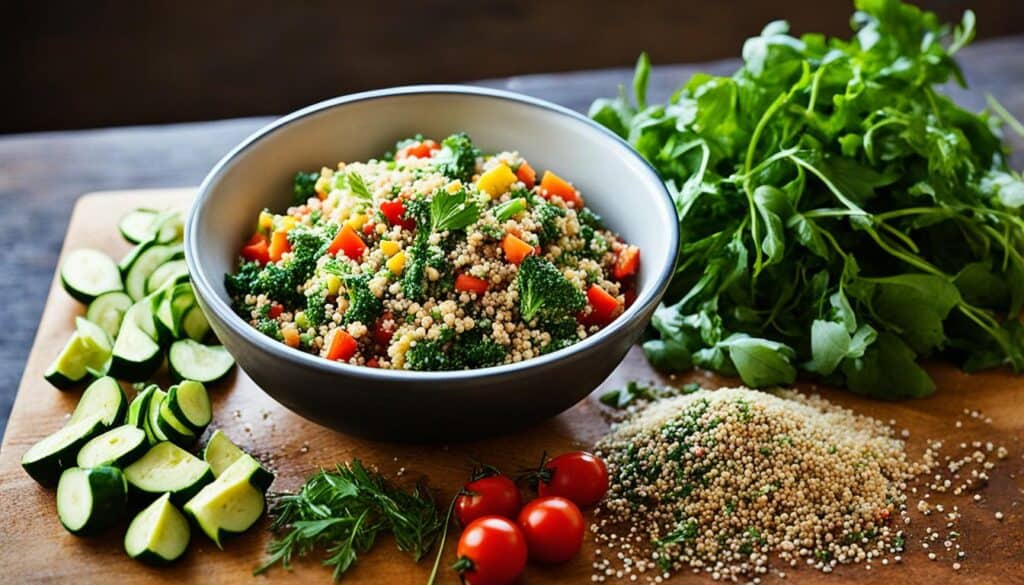
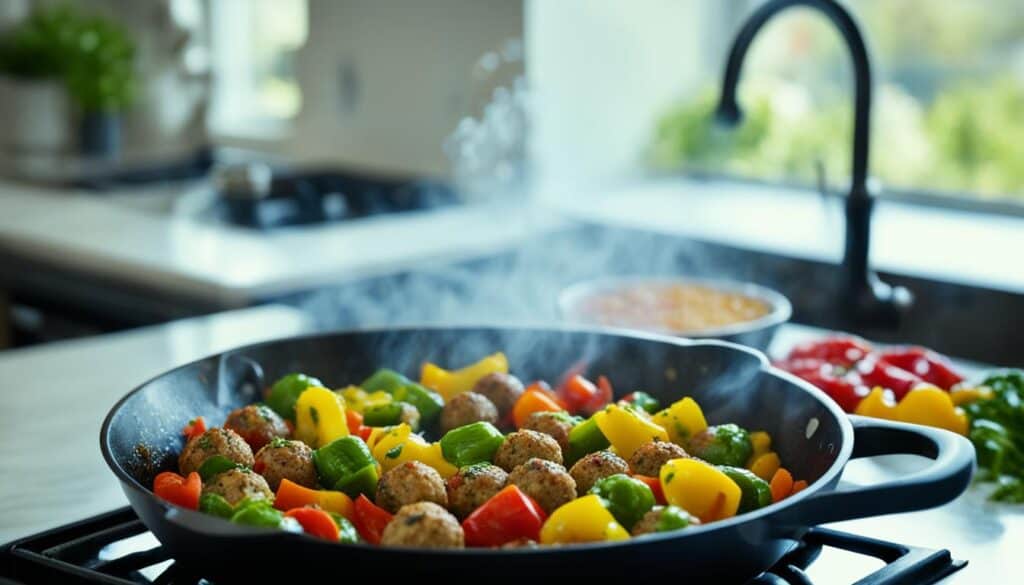
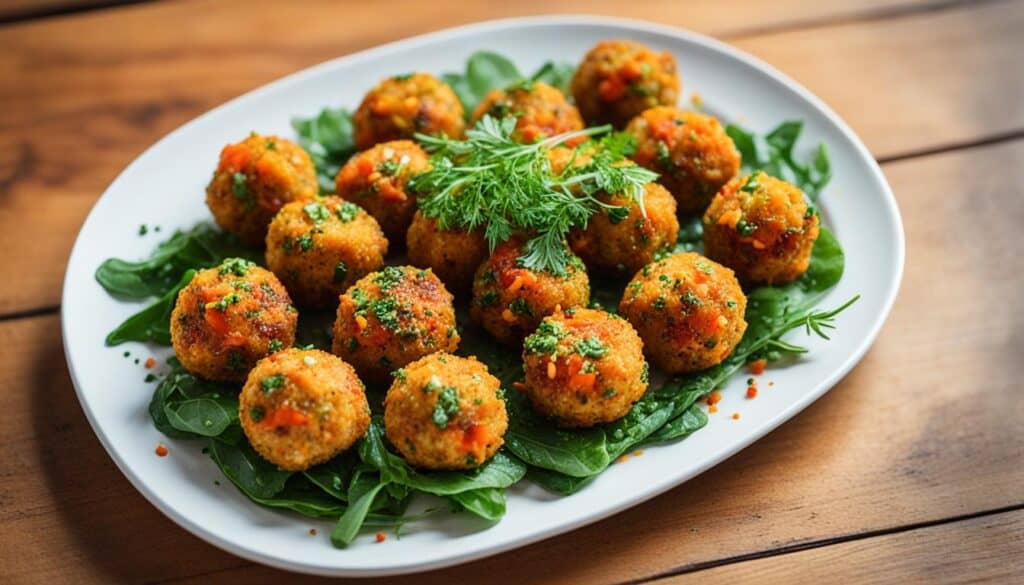
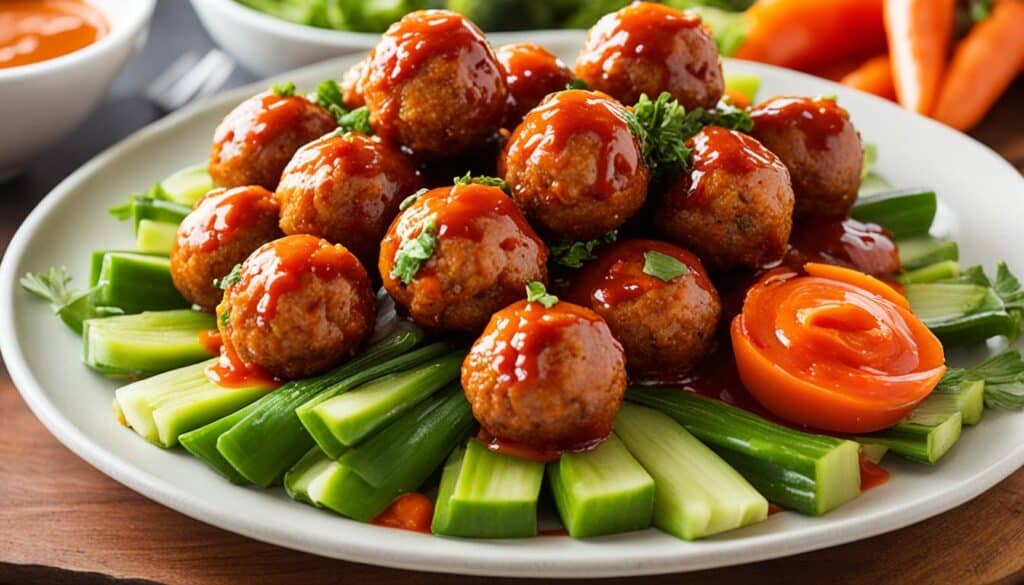
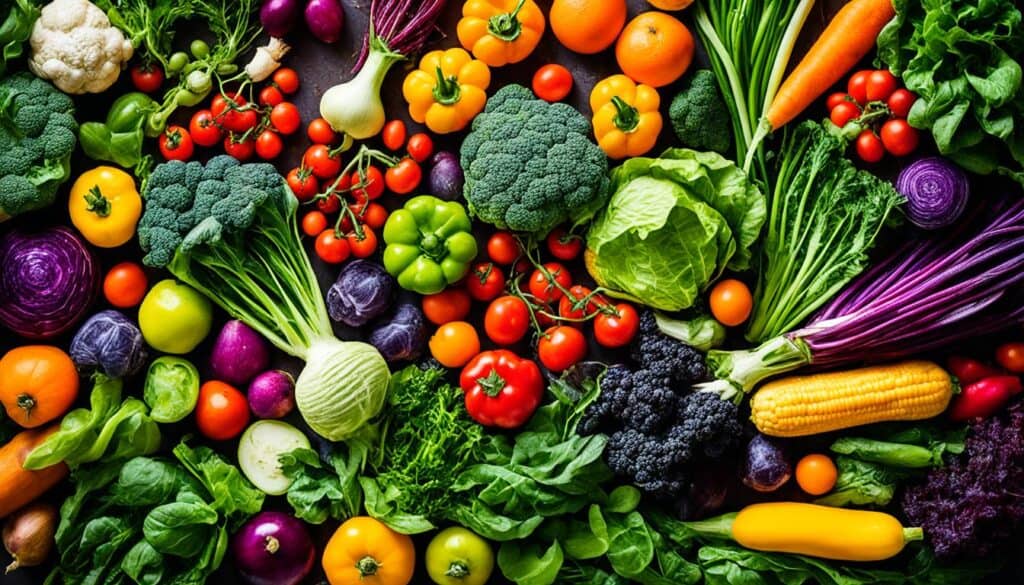



Leave a Reply